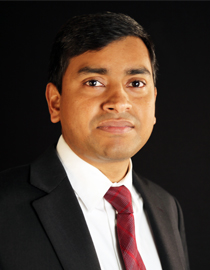Dr. M. M. Faruque Ha

Dr. M. M. Faruque Hasan
Texas A&M University, USA
Title: Designing for Small-scale, Distributed and Unconventional Feedstocks
Abstract
Modular processes show significant promise for the utilization of distributed and unconventional feedstocks such as stranded natural gas, associated gas, shale gas, biogas, landfill gas, and even flue gas. Their advantages come from simple plug-and-play operation, responsiveness to fluctuations in market conditions, low waste, and low investment risks. However, most modular processes are designed to perform a single task (e.g., air separation, fuel cell, cold box). When included in a larger plant, these modules increase the energy consumption and cost due to the lack of proper integration with other units. They also suffer from poor economies-of-scale. These limitations can be overcome through process intensification, which combines separation, conversion and/or other operations in “multi-tasking” units. Conceptually it is possible to intensify a process using a multifunctional material, but these materials may not always exist. In this presentation, we will present a multiscale framework for modular process intensification using existing single-functional materials. Significant opportunities exist for integrated processes that use multiple materials in a single unit (e.g., sorption-enhanced reaction processes). Specifically, we will discuss new contributions in the following areas: (i) Conceptual Design: how to select materials and their functions to create and exploit new process dynamics and trade-offs introduced by different functional materials in an intensified unit, (ii) Modular Process Synthesis: how to systematically arrange materials and configure operational cycles in cyclic/periodic, material-enhanced modular processes, and (iii) Multiscale Optimization: how to integrate the development of materials and process systems in a single framework.
Biography
M.M. Faruque Hasan is an Assistant Professor of the Artie McFerrin Department of Chemical Engineering at Texas A&M University, College Station, Texas, USA. He received his B.Sc. in Chemical Engineering from Bangladesh University of Engineering & Technology in 2005, and a Ph.D. in Chemical Engineering from the National University of Singapore in 2010. Prior to joining Texas A&M in 2014, he was a post-doctoral research associate at Princeton University from 2011–2014. His research focuses on developing theoretical and computational methods for multiscale process systems engineering with applications to the design, synthesis and intensification of both steady-state and dynamically operated cyclic processes, design and screening of nanoporous materials for gas separation, natural gas utilization, and carbon capture, utilization and storage. His research has been externally funded by the NSF, DOE, American Chemical Society Petroleum Research Fund, and Oak Ridge Associated Universities. Dr. Hasan is the recipient of the Doctoral New Investigator Award from the American Chemical Society Petroleum Research Fund (ACS PRF) in 2017; Outstanding Achievement Award from Texas A&M University in 2017; Best Paper Award from Computers & Chemical Engineering Journal in 2015; Ralph E. Powe Junior Faculty Enhancement Award in 2015; World Future Foundation PhD Award in Environmental and Sustainability Research in 2010; and the Best Technical Paper Award in the 1st Annual Gas Symposium in 2009. Dr. Hasan is a senior member of the American Institute of Chemical Engineers (AIChE), and currently serves as an Area Chair for the Computing & Systems Technology Division of AIChE.